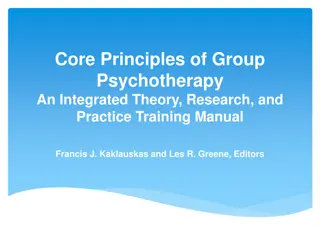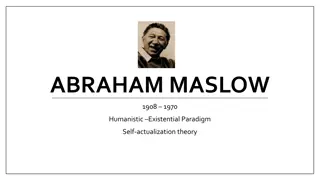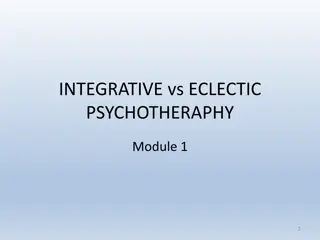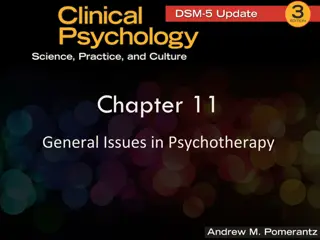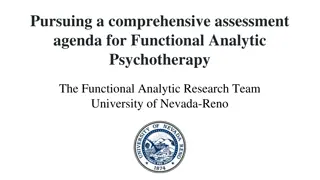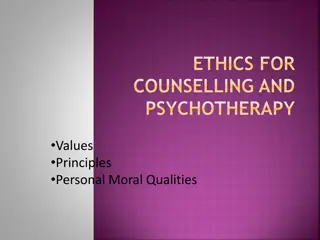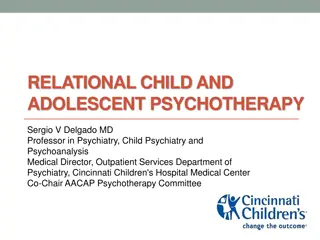Humanistic Psychotherapy: Core Concepts and Goals
Humanistic psychotherapy, led by figures like Carl Rogers and Abraham Maslow, emphasizes self-actualization and positive regard in therapy. The goal is to foster natural growth and wellness by promoting congruence between real and ideal selves. Essential therapeutic conditions include empathy, unconditional positive regard, and genuineness. While controversial, these conditions are considered necessary for successful therapy.
Download Presentation

Please find below an Image/Link to download the presentation.
The content on the website is provided AS IS for your information and personal use only. It may not be sold, licensed, or shared on other websites without obtaining consent from the author.If you encounter any issues during the download, it is possible that the publisher has removed the file from their server.
You are allowed to download the files provided on this website for personal or commercial use, subject to the condition that they are used lawfully. All files are the property of their respective owners.
The content on the website is provided AS IS for your information and personal use only. It may not be sold, licensed, or shared on other websites without obtaining consent from the author.
E N D
Presentation Transcript
Chapter 13 Humanistic Psychotherapy
Humanism Carl Rogers was a leading figure Abraham Maslow was another Humanism was a reaction against Freud s approach Assumed that human nature wasn t so bad (e.g., id-driven) Overlapping terms for humanism include nondirective, client-centered, and person-centered
Humanistic Concepts: Clinical Implications People have an inborn tendency toward self- actualization People also have a need for positive regard warmth, acceptance, prizing Sometimes, people are forced to sacrifice self- actualization in order to obtain positive regard from important others (e.g., parents)
Goal of Humanistic Psychotherapy Primary goal of humanistic psychotherapy is to foster self-actualization Problems stem from stifled self-actualization or growth Therapist s task is to create a climate in which the client can resume their natural growth toward psychological wellness
Goal of Humanistic Therapy (cont.) In humanistic therapy, there are no conditions of worth on the client Clients real selves can match their ideal selves This match is known as congruence, and is the root of psychological wellness Mismatch between real and ideal selves is known as incongruence, and is the root of psychopathology
Three Essential Therapeutic Conditions Empathy The therapist is able to sense the client s emotions just as the client would A deep, nonjudgmental, compassionate understanding of the client s experiences Unconditional Positive Regard Accepting or prizing the client no matter what and without judgment Genuineness Honesty toward client, rather than playing a role
Necessary and Sufficient? Rogers boldly argued that empathy, unconditional positive regard, and genuineness were necessary and sufficient for successful therapy with any client No other techniques needed for anyone A controversial claim Research is inconsistent; generally supports necessary, but not sufficient
Therapist Attitudes, Not Behaviors Rogers emphasized that empathy, unconditional positive regard, and genuineness are attitudes, not specific behaviors Therapy should not be mechanical or formulaic Attitudes, not specific techniques or skills, should be emphasized
Reflection: An Important Therapist Response Reflection of feeling is one therapist response that humanists do emphasize Reflection takes place when a therapist responds to a client by rephrasing or restating the client s statements in a way that highlights the client s feelings or emotions Communicates all three key ingredients Should be done with humility and not mechanically
Alternatives to Humanism Historical alternatives Existential psychotherapy Rollo May, Victor Frankl, Irvin Yalom Address anxiety of inescapable solitude of life Gestalt therapy Fritz Perls Holistic approach to enhancing current experience ( the now ); often uses role-plays
Motivational Interviewing Contemporary variation of humanistic therapy William Miller leading figure Address clients ambivalence or uncertainty about making major changes Help clients see the discrepancy between their behavior and their own values Elicit motivation to change from client; don t impose it on client Much empirical data supporting its efficacy with many problems Consistent with positive psychology movement
Motivational Interviewing (cont.) Central principles of MI Expressing empathy Developing the discrepancy Avoiding argumentation Rolling with resistance Identifying sustain talk and change talk Supporting self-efficacy
Positive Interventions and Strength-Based Counseling Positive psychology Emerged in 1990s Martin Seligman Emphasizes human strengths Bolster strengths to prevent and treat psychological problems Therapies: positive interventions, strength- based counseling
Other Contemporary Alternatives How Clients Make Therapy Work: The Process of Active Self-Healing Arthur Bohart and Karen Tallman Therapist s role is a collaborator Goes against symptom-focused, manualized approaches to therapy
How Well Does Humanism Work? Carl Rogers was a pioneer of psychotherapy outcome research, despite inherent problems in defining and measuring humanistic concepts However, in more recent years humanistic outcome research has decreased Recent meta-analyses suggest it is beneficial, at about the same rate as most other major therapies Extent to which empathy, positive regard, and genuineness are present correlates significantly with success of therapeutic relationship and ultimately the therapy










